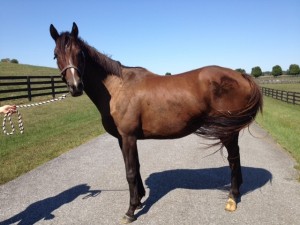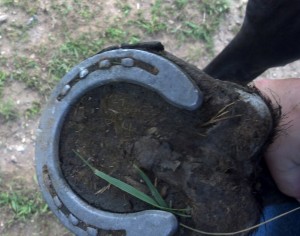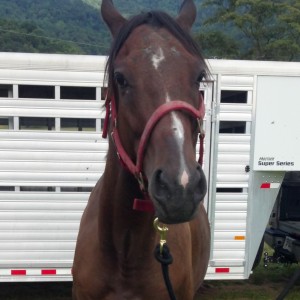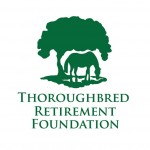On hooves so overgrown they jutted over the tops of his heavy, steel shoes, Grand Bailout moved his tired body into an awkward, choppy trot.
Dejected in every way, his long coat dull, his body ribbed with malnutrition, the year spent away from the limelight of Penn National racetrack and its cheering fans, had not been kind.
“The first thing I thought when I saw him was that he had had a very bad winter,” says Marlene Murray, a longtime horseman whose heart breaks when she thinks about how close this little racehorse came to slaughter.
His name alone, Grand Bailout, is an irony when Murray stops to think about it.
The scrappy gelding, who delivered close to $50,000 in winnings during his career, fell on hard times after last racing at Penn National in March 2011.
Dropping out of sight for over a year, the horse Murray swears wears a look of worry on his face, sadly found his way to the New Holland Auction, in May 2012, and was listed on a broker lot weeks later.
In the parlance of those dealing in auction- or broker-horses, the animal needed to be “bailed,” meaning, someone needed to pony up $650 to get Grand Bailout out of the Race name: Grand Bailout
Sire: Lion Heart
Dam: Princess Grand
Foal date: April 28, 2006
Earnings: $48,550slaughter pipeline, or he risked dying in a meat-processing plant.
This is where “angels” rushed in to help, Murray says.
When Grand Bailout was spotted on a Virginia horse-broker lot in June, California-based Thoroughbred advocate Deborah Jones spread the word, and soon, people came forward with the funds to “bail” him.
Dallas businessman John Murrell and Woodstock Farm in Kentucky were among those who stepped forward with the money to save the nondescript little bay horse.
From the brokerage lot, he was loaded onto a trailer, with a look that seemed to say, “Oh no, now where am I going?” Murray says.
Placed in quarantine for 90 days, Grand Bailout was treated by a farrier and attended by a veterinarian. The good news is that his feet are doing well now that the constrictive, heavy shoes have been removed, and his feet have had a proper trim.
But, he is only sound at the walk, she says.
“A vet check reveals that he is not sound at the trot or the canter, and he feels he may have a possible back injury, or some issue with his stifle,” she says.
What is important is that he is safe. The racehorse could have fallen through the cracks, but didn’t.
“I believe Grand Bailout had many angels watching over him, because he was in some precarious situations in his life,” says Murray, a longtime horseman and founder and president of charitable nonprofit R.A.C.E. Fund, which stands for Retirement Assistance and Care for Equines. “And we believe there will be other angels in his future.”
Murray’s entire life has been co-mingled with horses for as long as she can remember.
The daughter of a Thoroughbred racehorse trainer, she and her siblings all worked as trainers or in the Thoroughbred industry, and learned, above all, to value the animals who were so dear to them.
“Horses basically put food on the table for us as we were growing up,” she recalls. “There were some years when it was slim pickings. It was really tough. But, I think we all developed such a respect for horses because it was through them that my parents earned a living.”
And her family’s commitment to their horses didn’t falter when the horse got old and could no longer earn for them. Cherry Qua lived with her family until the day he died, at age 33.
He raced until he was 13, and after, became the family pet. “He taught all of us kids how to ride, he was in parades, he worked as a pony horse, you name it. He was like another child in our family.”
With good horsemanship principals guiding them, Murray and her two sisters, Patricia Bewley and Diana Meyers formed the Race Fund in 2004; it’s purpose is to assist in the care and rescue of ex-racehorse Thoroughbreds, as well as to advocate that racetracks do a better job helping ex-racehorses.
“We started R.A.C.E. Fund not only to help them retire, but to save them from slaughter,” she says.
In September, Grand Bailout emerged as the embodiment of everything her nonprofit would wish for a horse. Filled out and walking easier on his feet, his worried look has left him.
He is safe in the clover-covered pastures of the historic Long Branch farm in Virginia. This is his new home. He will not have to worry again.
“When I think of Grand Bailout’s story, a line from the Seabiscuit movie always comes to mind,” Murray says. “The quote is, ‘You don’t throw a whole life away just because it is banged up a little.’ ”





I have 2 thoroughbreds from the New Holland kill pen, and they almost seem to know that something is different for them, and even though their winnings at the track dwindled, they make my heart smile to watch them race across the back pasture. Thank you for sharing this story of Grand Bailout, such a beautiful ending!
Great quote and so true. So glad Grand Bailout was saved. Thanks for sharing the story, Susan.
A lady I know says, “We are kinder to our animals than we are to ourselves,” but in this case, Grand Bailout didn’t discover much kindness until he ran into RACE and people who appreciate the warriors.
I too love that quote from Seabiscuit. Great entry, Susan. Thanks.